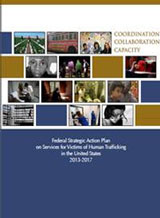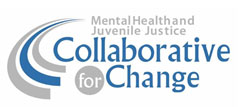OJJDP Issues Report on Mentoring Children of Incarcerated Parents
On September 30, 2013, OJJDP, in partnership with the White House Domestic Policy Council and Office of Public Engagement, organized a listening session, “Mentoring Children of Incarcerated Parents.” The session brought together national experts in mentoring, researchers, youth service providers, parents, and youth to discuss how to improve or enhance mentoring services for these vulnerable children. In January, OJJDP released a report that summarizes the research and stakeholder input shared during the listening session and offers recommendations for federal efforts to further advance the availability and effectiveness of mentoring for children of incarcerated parents. To read the report, visit the OJJDP Web site.
OJJDP Administrator Highlights Office’s Youth Violence Prevention Priorities at Chicago Area Project Meeting
On January 24, 2014, OJJDP Administrator Robert L. Listenbee gave a keynote address at the Chicago Area Project’s annual meeting, focusing on OJJDP’s youth violence prevention priorities and improving relationships between law enforcement and youth. Administrator Listenbee described OJJDP’s and the U.S. Department of Justice’s work on the national level to combat youth violence through the National Forum on Youth Violence Prevention, the Defending Childhood Initiative, and the Community-Based Violence Prevention program.
OJJDP-Funded Study Will Examine Impact of Family Visitation on Detained Youth
Exploratory research by the Vera Institute of Justice (Vera) suggests that increased family visitation is associated with better educational outcomes and behavior in incarcerated youth. With funds from OJJDP, Vera will conduct a 2-year study of the effect of expanded family visitation policies and practices on youth during confinement in Indiana Department of Correction, Division of Youth Services facilities as well as during the reentry phase. This research will inform juvenile justice leaders about ways to keep incarcerated young people and their families connected and how to improve youth's long-term outcomes and lower their recidivism rates.
Juvenile Justice Evaluation Center Releases January Newsletter
The National Juvenile Justice Evaluation Center, a project of the Justice Research and Statistics Association (JRSA) funded by OJJDP, has released its January 2014 bulletin. The issue includes an article on an evaluation of 19 programs under Colorado’s Juvenile Diversion grant program; a State Spotlight on Maryland’s Department of Human Resources’ Ready by 21 program; and information about resources available from the National Center on Safe Supportive Learning Environments. To access this issue of the newsletter, visit JRSA's Web site.
 Video of Webinar on CrimeSolutions.gov Now Available
Video of Webinar on CrimeSolutions.gov Now Available
On January 16, 2014, the Justice Research and Statistics Association (JRSA) hosted a Webinar in which Thomas Feucht, Executive Senior Science Advisor and Acting Deputy Director, National Institute of Justice, talked with Stan Orchowsky, JRSA’s Director of Research, about CrimeSolutions.gov. CrimeSolutions.gov is the Office of Justice Programs' searchable Web site of programs and practices and their effectiveness. The Webinar describes how the experts rate programs and practices and how the easily understandable ratings are helping agencies make evidence-based decisions. To access the archived Webinar, visit JRSA’s Web site.
Review Panel on Prison Rape Conducts Hearings
On January 8–9, 2014, the Review Panel on Prison Rape held hearings in Washington, DC, on sexual victimization in certain U.S. prisons, jails, and juvenile correctional facilities. The Office of Justice Programs’ Office for Civil Rights supports the work of the panel.
In accordance with the Prison Rape Elimination Act of 2003 (PREA), the panel conducts annual hearings to collect evidence to help the Bureau of Justice Statistics identify common characteristics of victims and perpetrators of prison rape. The panel also collects information about prisons and prison systems with a high incidence of prison rape as well as those that have been successful in deterring prison rape. Information about PREA-related publications and resources and transcripts and testimony from the panel’s hearings are available online.
 Federal Strategic Action Plan Unveiled at Human Trafficking Survivor Forum
Federal Strategic Action Plan Unveiled at Human Trafficking Survivor Forum
January was National Slavery and Human Trafficking Prevention Month. As part of the Administration’s effort to raise national awareness about this issue in January, the U.S. Department of Justice’s (DOJ’s) Office for Victims of Crime (OVC) organized a Human Trafficking Survivor Forum on January 14. The forum was conducted in coordination with the U.S. Departments of Homeland Security (DHS), State, and Health and Human Services (HHS); the Executive Office for U.S. Attorneys; the Office of Community Oriented Policing Services; and other DOJ components.
Held at the White House Conference Center, the forum featured 20 survivors who discussed strategies for effectively engaging survivor groups and incorporating their perspectives into approaches to combating human trafficking. The White House, along with officials from DOJ, HHS, and DHS, released the final Federal Strategic Action Plan on Services for Victims of Human Trafficking. In addition, OVC announced the availability of a new public service announcement, “The Faces of Human Trafficking.”
 MENTOR Releases Survey of Young People’s Perspectives on Mentoring
MENTOR Releases Survey of Young People’s Perspectives on Mentoring
A new report commissioned by MENTOR: The National Mentoring Partnership, The Mentoring Effect: Young People's Perspectives on the Outcomes and Availability of Mentoring links mentoring to significant life outcomes for youth and highlights a substantial gap that exists in America, especially for at-risk youth: one in three young people will reach adulthood without having a mentor. The publication outlines opportunities for the public, private, and philanthropic sectors to systemically integrate mentoring as a key youth-development strategy. It is the first nationally representative survey of young people on the topic of mentoring. The full report and executive summary are available on MENTOR’s Web site.
Resource Center on Mental Health and Juvenile Justice Established
The National Center for Mental Health and Juvenile Justice has launched the Mental Health and Juvenile Justice Collaborative for Change, one of four new online resource centers that the John D. and Catherine T. MacArthur Foundation supports as part of the new Models for Change Resource Center Partnership. The Collaborative for Change offers information and resources on mental health reforms that states involved in the  Models for Change initiative have developed and provides training and technical assistance for effectively implementing the reforms nationwide. The resource center covers a range of topics, including mental health screening and risk/needs assessment for youth in juvenile justice settings; diversion strategies and program models for youth with mental health needs; training for juvenile justice staff and police on adolescent development and mental health needs; and coordination and integration of juvenile justice and child welfare systems to improve outcomes for youth.
Models for Change initiative have developed and provides training and technical assistance for effectively implementing the reforms nationwide. The resource center covers a range of topics, including mental health screening and risk/needs assessment for youth in juvenile justice settings; diversion strategies and program models for youth with mental health needs; training for juvenile justice staff and police on adolescent development and mental health needs; and coordination and integration of juvenile justice and child welfare systems to improve outcomes for youth.
